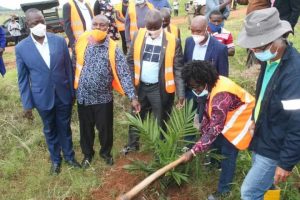By Denis Jjuuko
While on a trip from Kalangala sometime back, I met a man who looked every inch in his sixties on the ferry as we crossed Lake Victoria from the island to Masaka. He seemed to have recently dyed his hair dark black. He was wearing an oversize double breast jacket. He had a young man in his company, who was carrying a small backpack he couldn’t put down. I had seen him park a Land Rover Freelander on the ferry. I was fascinated.
Although the car had seen a bit of days, I didn’t expect him to be driving such a car in a rural setting where Toyotas rule the roads. So I wanted to know what he did for a living and where he was heading. I was interested in knowing his story.
Naturally I started up small talk. It had rained the whole morning and we started with rising water levels. With the ferry engines roaring nonstop and the lake so calm, I asked him what he did for a living — a living that would make him driver a Land Rover Freelander! He told me he was on a business trip to Masaka and may end up in Rakai depending on his prospects. He said he was on a mission to expand his farm. I had mistaken him for a fisherman or somebody involved in the fishing value chain.
He told me his father somewhat discouraged him from fishing as a kid saying the lake was dangerous and always left him at home as he went on his fishing excursions. So when he dropped out of school, he concentrated on farming.
He said he wanted to look for land in Masaka when it was still affordable. He said he had received information that the government was planning to establish oil palm growing beyond the island of Bugala in Kalangala. “If government goes ahead and starts oil palm growing in Masaka, the land prices will go up,” he said. “That is why I want to go to Rakai as well because government plans to establish oil palm in Sango Bay area,” he informed me.
He was involved in oil palm growing in Kalangala where he established a plantation on about 100 acres. “I have given most of the Kalangala farm to my children. I only own about 28 acres now of oil palm trees and another 10 for food,” he said. “I am too old to be buying food,” he joked.
I was still enjoying the talk when the ferry captain sounded the horn indicating arrival in Bukakata and end of my talk with this interesting businessman. At the pier in Bukakata, we said goodbye before he told me that if I ever come back to Kalangala I should simply ask any boda man to direct me to his home. “Simply ask them to bring you to Kinazi Kyabala, my home is along the main road,” he said, braggingly. Kinazi Kyabala is Luganda for oil palm is profitable. Given his car and business acumen, he may not have lied.
I watched a TV story last week that the private sector players having seen how Kalangala has developed, are not waiting for government to establish nucleus estates for oil palm in Masaka, Rakai and in the Aswa region in northern Uganda. They are establishing the farms themselves. To meet current palm oil demand, Uganda needs to grow 100,000 hectares of oil palm. In Kalanga and Buvuma, the numbers are below 20,000 hectares so far.
The price of oil palm fresh fruit bunches in Uganda has grown from approximately Shs200 a kilo in 2010 when the oil palm harvests started to more than Shs900 in July 2021. Data from the National Oil Palm Project indicate that on average, a farmer earns between Shs400,000 to Shs600,000 per acre per a month.
Smallholder oil palm growers in Kalangala like the man I met on the ferry who number 2,063 (with about 1300 of them with harvestable crops) earn approximately Shs5 billion every month. This is a huge income for these farmers and no wonder the old man I met on the ferry was driving a Freelander to stand out. From his farm, he could afford it.
The government and indeed local leaders should mobilise farmers in the areas where the private sector is acquiring land so that they learn from Kalangala farmers and embrace this crop instead of only selling land to the private sector. Oil palm trees take four years to mature and harvestable every 10 days for about 18 to 25 years before they are replaced. This kind of predictable income is what the majority of our farmers need to get themselves out of poverty.
The writer is a communication and visibility consultant. djjuuko@gmail.com










